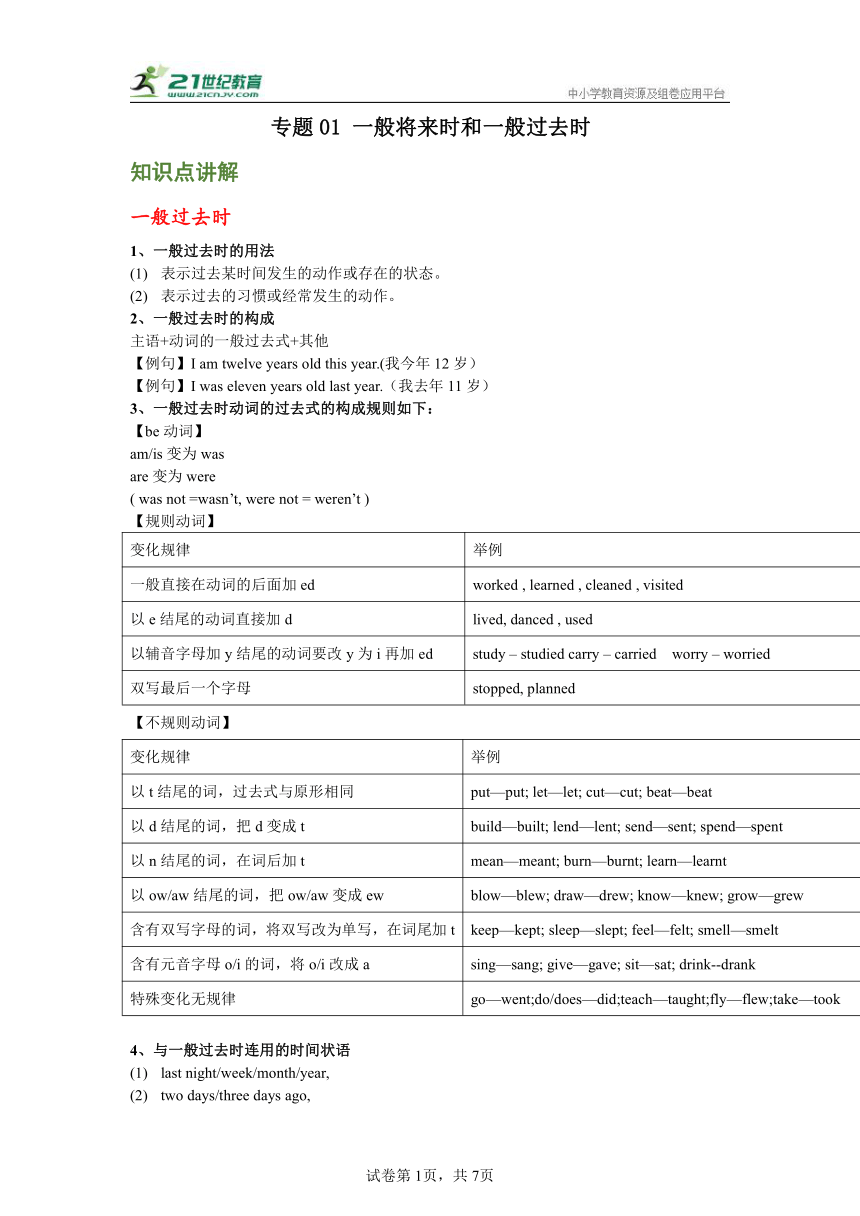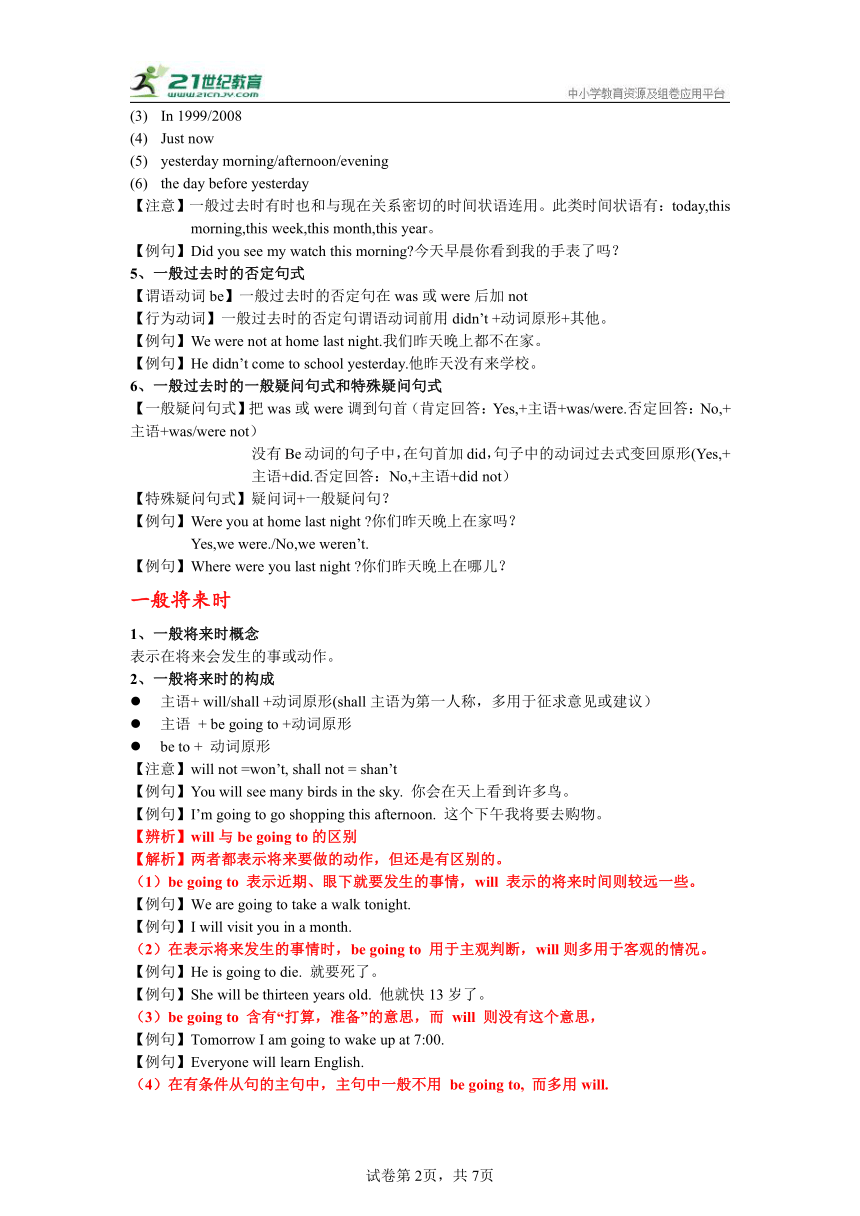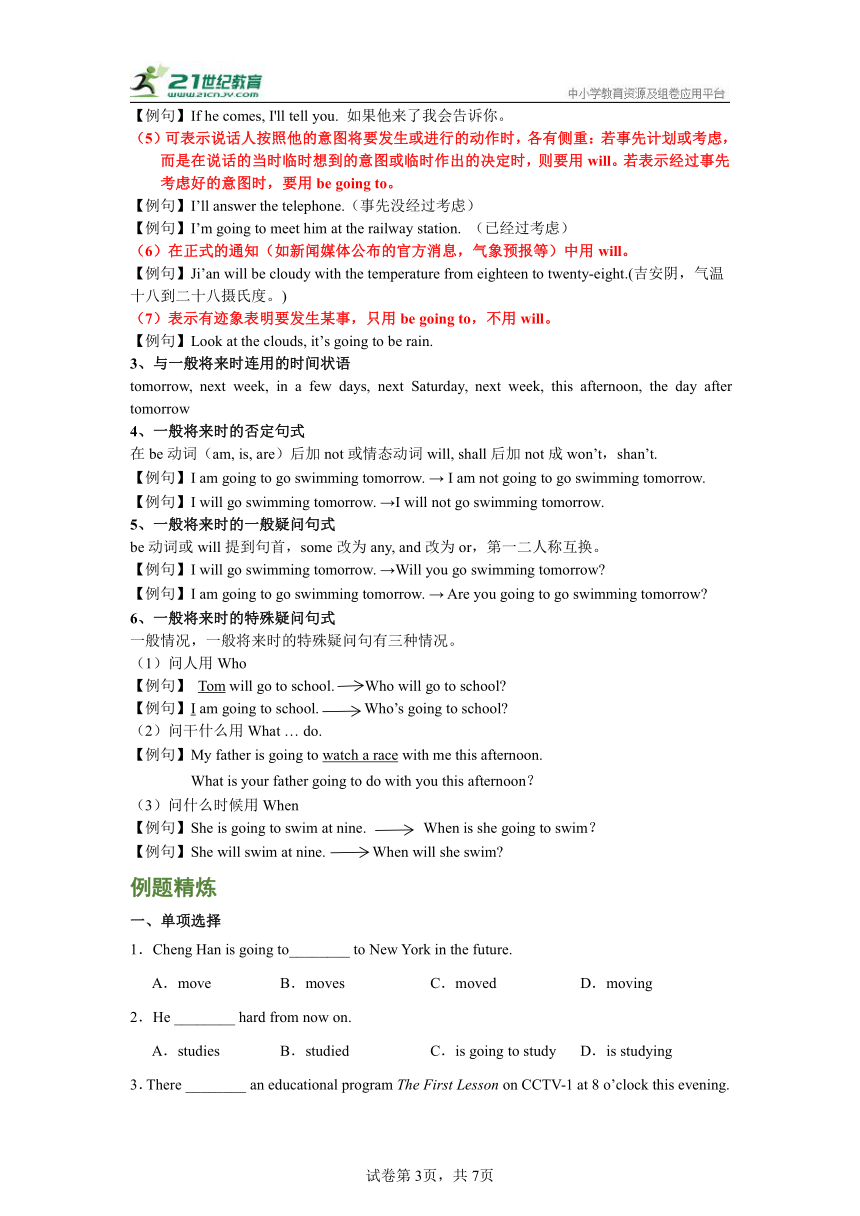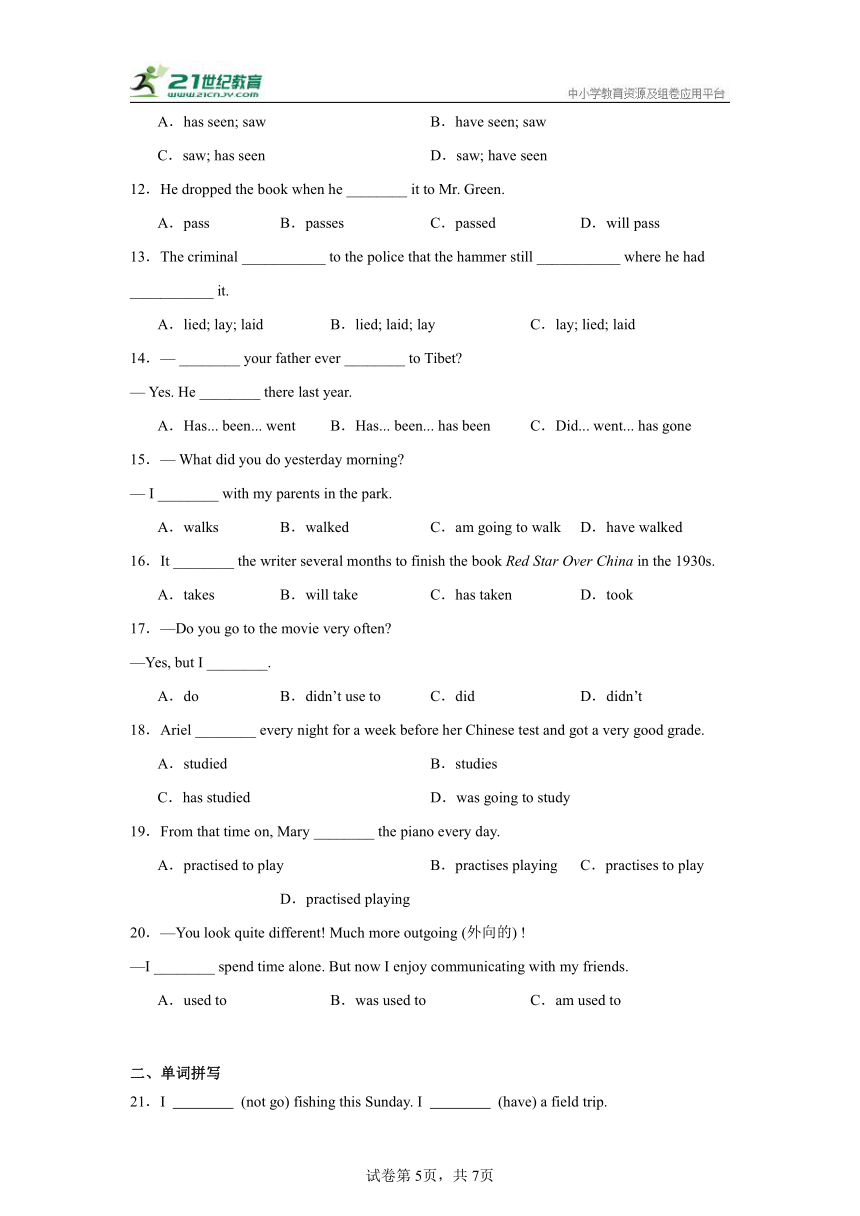专题01 一般将来时和一般过去时【弯道超车】暑假新八年级英语 语法知识点讲解+例题精炼(牛津译林版)
文档属性
| 名称 | 专题01 一般将来时和一般过去时【弯道超车】暑假新八年级英语 语法知识点讲解+例题精炼(牛津译林版) |

|
|
| 格式 | docx | ||
| 文件大小 | 47.9KB | ||
| 资源类型 | 试卷 | ||
| 版本资源 | 牛津译林版 | ||
| 科目 | 英语 | ||
| 更新时间 | 2024-07-13 00:00:00 | ||
图片预览





文档简介
专题01 一般将来时和一般过去时
知识点讲解
一般过去时
1、一般过去时的用法
表示过去某时间发生的动作或存在的状态。
表示过去的习惯或经常发生的动作。
2、一般过去时的构成
主语+动词的一般过去式+其他
【例句】I am twelve years old this year.(我今年12岁)
【例句】I was eleven years old last year.(我去年11岁)
3、一般过去时动词的过去式的构成规则如下:
【be动词】
am/is变为was
are变为were
( was not =wasn’t, were not = weren’t )
【规则动词】
变化规律 举例
一般直接在动词的后面加ed worked , learned , cleaned , visited
以e结尾的动词直接加d lived, danced , used
以辅音字母加y结尾的动词要改y为i再加ed study – studied carry – carried worry – worried
双写最后一个字母 stopped, planned
【不规则动词】
变化规律 举例
以t结尾的词,过去式与原形相同 put—put; let—let; cut—cut; beat—beat
以d结尾的词,把d变成t build—built; lend—lent; send—sent; spend—spent
以n结尾的词,在词后加t mean—meant; burn—burnt; learn—learnt
以ow/aw结尾的词,把ow/aw变成ew blow—blew; draw—drew; know—knew; grow—grew
含有双写字母的词,将双写改为单写,在词尾加t keep—kept; sleep—slept; feel—felt; smell—smelt
含有元音字母o/i的词,将o/i改成a sing—sang; give—gave; sit—sat; drink--drank
特殊变化无规律 go—went;do/does—did;teach—taught;fly—flew;take—took
4、与一般过去时连用的时间状语
last night/week/month/year,
two days/three days ago,
In 1999/2008
Just now
yesterday morning/afternoon/evening
the day before yesterday
【注意】一般过去时有时也和与现在关系密切的时间状语连用。此类时间状语有:today,this morning,this week,this month,this year。
【例句】Did you see my watch this morning 今天早晨你看到我的手表了吗?
5、一般过去时的否定句式
【谓语动词be】一般过去时的否定句在was或were后加not
【行为动词】一般过去时的否定句谓语动词前用didn’t +动词原形+其他。
【例句】We were not at home last night.我们昨天晚上都不在家。
【例句】He didn’t come to school yesterday.他昨天没有来学校。
6、一般过去时的一般疑问句式和特殊疑问句式
【一般疑问句式】把was或were调到句首(肯定回答:Yes,+主语+was/were.否定回答:No,+主语+was/were not)
没有Be动词的句子中,在句首加did,句子中的动词过去式变回原形(Yes,+主语+did.否定回答:No,+主语+did not)
【特殊疑问句式】疑问词+一般疑问句?
【例句】Were you at home last night 你们昨天晚上在家吗?
Yes,we were./No,we weren’t.
【例句】Where were you last night 你们昨天晚上在哪儿?
一般将来时
1、一般将来时概念
表示在将来会发生的事或动作。
2、一般将来时的构成
主语+ will/shall +动词原形(shall主语为第一人称,多用于征求意见或建议)
主语 + be going to +动词原形
be to + 动词原形
【注意】will not =won’t, shall not = shan’t
【例句】You will see many birds in the sky. 你会在天上看到许多鸟。
【例句】I’m going to go shopping this afternoon. 这个下午我将要去购物。
【辨析】will与be going to的区别
【解析】两者都表示将来要做的动作,但还是有区别的。
(1)be going to 表示近期、眼下就要发生的事情,will 表示的将来时间则较远一些。
【例句】We are going to take a walk tonight.
【例句】I will visit you in a month.
在表示将来发生的事情时,be going to 用于主观判断,will则多用于客观的情况。
【例句】He is going to die. 就要死了。
【例句】She will be thirteen years old. 他就快13岁了。
(3)be going to 含有“打算,准备”的意思,而 will 则没有这个意思,
【例句】Tomorrow I am going to wake up at 7:00.
【例句】Everyone will learn English.
(4)在有条件从句的主句中,主句中一般不用 be going to, 而多用will.
【例句】If he comes, I'll tell you. 如果他来了我会告诉你。
(5)可表示说话人按照他的意图将要发生或进行的动作时,各有侧重:若事先计划或考虑,而是在说话的当时临时想到的意图或临时作出的决定时,则要用will。若表示经过事先考虑好的意图时,要用be going to。
【例句】I’ll answer the telephone.(事先没经过考虑)
【例句】I’m going to meet him at the railway station. (已经过考虑)
(6)在正式的通知(如新闻媒体公布的官方消息,气象预报等)中用will。
【例句】Ji’an will be cloudy with the temperature from eighteen to twenty-eight.(吉安阴,气温十八到二十八摄氏度。)
(7)表示有迹象表明要发生某事,只用be going to,不用will。
【例句】Look at the clouds, it’s going to be rain.
3、与一般将来时连用的时间状语
tomorrow, next week, in a few days, next Saturday, next week, this afternoon, the day after tomorrow
4、一般将来时的否定句式
在be动词(am, is, are)后加not或情态动词will, shall后加not成won’t,shan’t.
【例句】I am going to go swimming tomorrow. → I am not going to go swimming tomorrow.
【例句】I will go swimming tomorrow. →I will not go swimming tomorrow.
5、一般将来时的一般疑问句式
be动词或will提到句首,some改为any, and改为or,第一二人称互换。
【例句】I will go swimming tomorrow. →Will you go swimming tomorrow
【例句】I am going to go swimming tomorrow. → Are you going to go swimming tomorrow
6、一般将来时的特殊疑问句式
一般情况,一般将来时的特殊疑问句有三种情况。
问人用Who
【例句】 Tom will go to school. Who will go to school
【例句】I am going to school. Who’s going to school
问干什么用What … do.
【例句】My father is going to watch a race with me this afternoon.
What is your father going to do with you this afternoon?
(3)问什么时候用When
【例句】She is going to swim at nine. When is she going to swim?
【例句】She will swim at nine. When will she swim
例题精炼
一、单项选择
1.Cheng Han is going to________ to New York in the future.
A.move B.moves C.moved D.moving
2.He ________ hard from now on.
A.studies B.studied C.is going to study D.is studying
3.There ________ an educational program The First Lesson on CCTV-1 at 8 o’clock this evening.
A.will have B.is going to be
C.is having D.is going to have
4.He likes Chinese best. He says he’s going ________ a Chinese teacher in the future.
A.to do B.become
C.be D.to be
5.There ________ a football game tomorrow.
A.is going to have B.are going to be C.is going to be D.are going to have
6.—Will your sister ________ to Beijing to look for a job
—Yes, she ________.
A.goes; is B.go; does
C.go; will D.going; will
7.—You’d better take an umbrella. The weather report says it ________ in the afternoon.
—Thank you. I will put one in my bag.
A.rain B.rains
C.will rain D.is raining
8.—Has your father come back yet
—No. He ________ come back ________ this Sunday.
A.doesn’t; until B.won’t; after
C.doesn’t; after D.won’t; until
9.Next week, each student in the class ________ a small gift from their teachers.
A.receives
B.received
C.will receive
D.going to receive
10.—Where did you go last winter
—I ________ to Hainan.
A.go B.went
C.will go D.is going
11.—Tom, let’s go to see the movie You Only Live Once this weekend.
—Sorry, I ________ it. I ________ it with my parents yesterday.
A.has seen; saw B.have seen; saw
C.saw; has seen D.saw; have seen
12.He dropped the book when he ________ it to Mr. Green.
A.pass B.passes C.passed D.will pass
13.The criminal ___________ to the police that the hammer still ___________ where he had ___________ it.
A.lied; lay; laid B.lied; laid; lay C.lay; lied; laid
14.— ________ your father ever ________ to Tibet
— Yes. He ________ there last year.
A.Has... been... went B.Has... been... has been C.Did... went... has gone
15.— What did you do yesterday morning
— I ________ with my parents in the park.
A.walks B.walked C.am going to walk D.have walked
16.It ________ the writer several months to finish the book Red Star Over China in the 1930s.
A.takes B.will take C.has taken D.took
17.—Do you go to the movie very often
—Yes, but I ________.
A.do B.didn’t use to C.did D.didn’t
18.Ariel ________ every night for a week before her Chinese test and got a very good grade.
A.studied B.studies
C.has studied D.was going to study
19.From that time on, Mary ________ the piano every day.
A.practised to play B.practises playing C.practises to play D.practised playing
20.—You look quite different! Much more outgoing (外向的) !
—I ________ spend time alone. But now I enjoy communicating with my friends.
A.used to B.was used to C.am used to
二、单词拼写
21.I (not go) fishing this Sunday. I (have) a field trip.
22.Are your classmates going to (play) basketball next Saturday
23.Tom (pick) apples on the farm next Sunday.
24.The new department will a lots of people because it will be the best in the area.
25.We will r the hotel in the late afternoon.
26.—When will you b to play computer games with me
—After I finish doing my homework.
27.Mom (choose) a red coat for me last Sunday.
28.After two months’ training, Harry (success) in bringing the trained dog home last week.
29.The river (上升) during the storm and swept away the old bridge over it.
30.Mary’s father (修理) her computer yesterday morning.
31.“Good morning!” The bird (greet) me as usual.
32.Mary often out with friends when she was young. (hang)
33.The little boy s his head and said “no” to his mother.
34.He had no idea how to take care of himself and he often fell ill and his grades d .
35.Jack used to computer games but now he likes playing basketball. (对……感兴趣)
36.She used to (go) to bed late. But now she has changed this bad habit.
三、完成句子
37.我将带领你们参观电台。
I am going to you the radio station.
38.be, you, going, football player, are, to, a
39.a, going, doctor, to, are, why, you, be
40.明天的天气将会怎样?
What will the weather tomorrow
41.我将邀请你和我一起来。
I will you come with me.
42.昨天晚上我熬夜很晚观看电视上的一场足球赛。
Last night I watching a soccer game on TV.
43.那个男孩在两年前失踪了,并且再也没回来过。
The boy two years ago and never came back.
44.她鼓励我们写出在营地里的经历。
She write about our experiences at the camp.
45.The rain beat heavily against the window. (改为一般疑问句)
the rain heavily against the window
46.Cathy cut herself when making dinner. (改为否定句)
Cathy herself when making dinner.
47.for, every, I, hours, day, practiced, four
.
48.有时他在学校给建筑物绘画时会遇到麻烦。
He sometimes for painting the buildings at school.
49.played, on, I, weekends, games
.
50.她看了看我,什么也没说,笑了。
She me and, without a word, smiled.
51.我的朋友杰克过去常常吃很多垃圾食品。(完成译句)
My friend Jack have a lot of junk food.
52.他过去常常是吃过就躺下了,但现在不了——他需要减肥了。(lie)
He after dinner. But now he doesn’t—he needs to lose weight.
53.Zhang Liang , but now he is a model.
张亮过去是一名厨师,但是现在他是一名模特。(cook)
试卷第1页,共3页
试卷第1页,共3页
参考答案:
1.A
2.C
3.B
4.D
5.C
6.C
7.C
8.D
9.C
10.B
11.B
12.C
13.A
14.A
15.B
16.D
17.B
18.A
19.D
20.A
21. am not going am going to have
22.play
23.is going to pick/will pick
24.(a)ttract
25.(r)each
26.(b)egin
27.chose
28.succeeded
29.rose
30.repaired/fixed
31.greeted
32.hung
33.(s)hook
34.(d)ropped
35.be interested in
36.go
37. take around
38.Are you going to be a football player
39.Why are you going to be a doctor
40. be like
41. invite to
42. stayed up late
43. got lost
44. encouraged us to
45. Did beat
46.didn’t cut
47.I practiced for four hours every day
48. gets/got in trouble
49.I played games on weekends
50. looked at
51. used to
52.used to lie down
53.used to be a cook
答案第1页,共2页
答案第1页,共2页
知识点讲解
一般过去时
1、一般过去时的用法
表示过去某时间发生的动作或存在的状态。
表示过去的习惯或经常发生的动作。
2、一般过去时的构成
主语+动词的一般过去式+其他
【例句】I am twelve years old this year.(我今年12岁)
【例句】I was eleven years old last year.(我去年11岁)
3、一般过去时动词的过去式的构成规则如下:
【be动词】
am/is变为was
are变为were
( was not =wasn’t, were not = weren’t )
【规则动词】
变化规律 举例
一般直接在动词的后面加ed worked , learned , cleaned , visited
以e结尾的动词直接加d lived, danced , used
以辅音字母加y结尾的动词要改y为i再加ed study – studied carry – carried worry – worried
双写最后一个字母 stopped, planned
【不规则动词】
变化规律 举例
以t结尾的词,过去式与原形相同 put—put; let—let; cut—cut; beat—beat
以d结尾的词,把d变成t build—built; lend—lent; send—sent; spend—spent
以n结尾的词,在词后加t mean—meant; burn—burnt; learn—learnt
以ow/aw结尾的词,把ow/aw变成ew blow—blew; draw—drew; know—knew; grow—grew
含有双写字母的词,将双写改为单写,在词尾加t keep—kept; sleep—slept; feel—felt; smell—smelt
含有元音字母o/i的词,将o/i改成a sing—sang; give—gave; sit—sat; drink--drank
特殊变化无规律 go—went;do/does—did;teach—taught;fly—flew;take—took
4、与一般过去时连用的时间状语
last night/week/month/year,
two days/three days ago,
In 1999/2008
Just now
yesterday morning/afternoon/evening
the day before yesterday
【注意】一般过去时有时也和与现在关系密切的时间状语连用。此类时间状语有:today,this morning,this week,this month,this year。
【例句】Did you see my watch this morning 今天早晨你看到我的手表了吗?
5、一般过去时的否定句式
【谓语动词be】一般过去时的否定句在was或were后加not
【行为动词】一般过去时的否定句谓语动词前用didn’t +动词原形+其他。
【例句】We were not at home last night.我们昨天晚上都不在家。
【例句】He didn’t come to school yesterday.他昨天没有来学校。
6、一般过去时的一般疑问句式和特殊疑问句式
【一般疑问句式】把was或were调到句首(肯定回答:Yes,+主语+was/were.否定回答:No,+主语+was/were not)
没有Be动词的句子中,在句首加did,句子中的动词过去式变回原形(Yes,+主语+did.否定回答:No,+主语+did not)
【特殊疑问句式】疑问词+一般疑问句?
【例句】Were you at home last night 你们昨天晚上在家吗?
Yes,we were./No,we weren’t.
【例句】Where were you last night 你们昨天晚上在哪儿?
一般将来时
1、一般将来时概念
表示在将来会发生的事或动作。
2、一般将来时的构成
主语+ will/shall +动词原形(shall主语为第一人称,多用于征求意见或建议)
主语 + be going to +动词原形
be to + 动词原形
【注意】will not =won’t, shall not = shan’t
【例句】You will see many birds in the sky. 你会在天上看到许多鸟。
【例句】I’m going to go shopping this afternoon. 这个下午我将要去购物。
【辨析】will与be going to的区别
【解析】两者都表示将来要做的动作,但还是有区别的。
(1)be going to 表示近期、眼下就要发生的事情,will 表示的将来时间则较远一些。
【例句】We are going to take a walk tonight.
【例句】I will visit you in a month.
在表示将来发生的事情时,be going to 用于主观判断,will则多用于客观的情况。
【例句】He is going to die. 就要死了。
【例句】She will be thirteen years old. 他就快13岁了。
(3)be going to 含有“打算,准备”的意思,而 will 则没有这个意思,
【例句】Tomorrow I am going to wake up at 7:00.
【例句】Everyone will learn English.
(4)在有条件从句的主句中,主句中一般不用 be going to, 而多用will.
【例句】If he comes, I'll tell you. 如果他来了我会告诉你。
(5)可表示说话人按照他的意图将要发生或进行的动作时,各有侧重:若事先计划或考虑,而是在说话的当时临时想到的意图或临时作出的决定时,则要用will。若表示经过事先考虑好的意图时,要用be going to。
【例句】I’ll answer the telephone.(事先没经过考虑)
【例句】I’m going to meet him at the railway station. (已经过考虑)
(6)在正式的通知(如新闻媒体公布的官方消息,气象预报等)中用will。
【例句】Ji’an will be cloudy with the temperature from eighteen to twenty-eight.(吉安阴,气温十八到二十八摄氏度。)
(7)表示有迹象表明要发生某事,只用be going to,不用will。
【例句】Look at the clouds, it’s going to be rain.
3、与一般将来时连用的时间状语
tomorrow, next week, in a few days, next Saturday, next week, this afternoon, the day after tomorrow
4、一般将来时的否定句式
在be动词(am, is, are)后加not或情态动词will, shall后加not成won’t,shan’t.
【例句】I am going to go swimming tomorrow. → I am not going to go swimming tomorrow.
【例句】I will go swimming tomorrow. →I will not go swimming tomorrow.
5、一般将来时的一般疑问句式
be动词或will提到句首,some改为any, and改为or,第一二人称互换。
【例句】I will go swimming tomorrow. →Will you go swimming tomorrow
【例句】I am going to go swimming tomorrow. → Are you going to go swimming tomorrow
6、一般将来时的特殊疑问句式
一般情况,一般将来时的特殊疑问句有三种情况。
问人用Who
【例句】 Tom will go to school. Who will go to school
【例句】I am going to school. Who’s going to school
问干什么用What … do.
【例句】My father is going to watch a race with me this afternoon.
What is your father going to do with you this afternoon?
(3)问什么时候用When
【例句】She is going to swim at nine. When is she going to swim?
【例句】She will swim at nine. When will she swim
例题精炼
一、单项选择
1.Cheng Han is going to________ to New York in the future.
A.move B.moves C.moved D.moving
2.He ________ hard from now on.
A.studies B.studied C.is going to study D.is studying
3.There ________ an educational program The First Lesson on CCTV-1 at 8 o’clock this evening.
A.will have B.is going to be
C.is having D.is going to have
4.He likes Chinese best. He says he’s going ________ a Chinese teacher in the future.
A.to do B.become
C.be D.to be
5.There ________ a football game tomorrow.
A.is going to have B.are going to be C.is going to be D.are going to have
6.—Will your sister ________ to Beijing to look for a job
—Yes, she ________.
A.goes; is B.go; does
C.go; will D.going; will
7.—You’d better take an umbrella. The weather report says it ________ in the afternoon.
—Thank you. I will put one in my bag.
A.rain B.rains
C.will rain D.is raining
8.—Has your father come back yet
—No. He ________ come back ________ this Sunday.
A.doesn’t; until B.won’t; after
C.doesn’t; after D.won’t; until
9.Next week, each student in the class ________ a small gift from their teachers.
A.receives
B.received
C.will receive
D.going to receive
10.—Where did you go last winter
—I ________ to Hainan.
A.go B.went
C.will go D.is going
11.—Tom, let’s go to see the movie You Only Live Once this weekend.
—Sorry, I ________ it. I ________ it with my parents yesterday.
A.has seen; saw B.have seen; saw
C.saw; has seen D.saw; have seen
12.He dropped the book when he ________ it to Mr. Green.
A.pass B.passes C.passed D.will pass
13.The criminal ___________ to the police that the hammer still ___________ where he had ___________ it.
A.lied; lay; laid B.lied; laid; lay C.lay; lied; laid
14.— ________ your father ever ________ to Tibet
— Yes. He ________ there last year.
A.Has... been... went B.Has... been... has been C.Did... went... has gone
15.— What did you do yesterday morning
— I ________ with my parents in the park.
A.walks B.walked C.am going to walk D.have walked
16.It ________ the writer several months to finish the book Red Star Over China in the 1930s.
A.takes B.will take C.has taken D.took
17.—Do you go to the movie very often
—Yes, but I ________.
A.do B.didn’t use to C.did D.didn’t
18.Ariel ________ every night for a week before her Chinese test and got a very good grade.
A.studied B.studies
C.has studied D.was going to study
19.From that time on, Mary ________ the piano every day.
A.practised to play B.practises playing C.practises to play D.practised playing
20.—You look quite different! Much more outgoing (外向的) !
—I ________ spend time alone. But now I enjoy communicating with my friends.
A.used to B.was used to C.am used to
二、单词拼写
21.I (not go) fishing this Sunday. I (have) a field trip.
22.Are your classmates going to (play) basketball next Saturday
23.Tom (pick) apples on the farm next Sunday.
24.The new department will a lots of people because it will be the best in the area.
25.We will r the hotel in the late afternoon.
26.—When will you b to play computer games with me
—After I finish doing my homework.
27.Mom (choose) a red coat for me last Sunday.
28.After two months’ training, Harry (success) in bringing the trained dog home last week.
29.The river (上升) during the storm and swept away the old bridge over it.
30.Mary’s father (修理) her computer yesterday morning.
31.“Good morning!” The bird (greet) me as usual.
32.Mary often out with friends when she was young. (hang)
33.The little boy s his head and said “no” to his mother.
34.He had no idea how to take care of himself and he often fell ill and his grades d .
35.Jack used to computer games but now he likes playing basketball. (对……感兴趣)
36.She used to (go) to bed late. But now she has changed this bad habit.
三、完成句子
37.我将带领你们参观电台。
I am going to you the radio station.
38.be, you, going, football player, are, to, a
39.a, going, doctor, to, are, why, you, be
40.明天的天气将会怎样?
What will the weather tomorrow
41.我将邀请你和我一起来。
I will you come with me.
42.昨天晚上我熬夜很晚观看电视上的一场足球赛。
Last night I watching a soccer game on TV.
43.那个男孩在两年前失踪了,并且再也没回来过。
The boy two years ago and never came back.
44.她鼓励我们写出在营地里的经历。
She write about our experiences at the camp.
45.The rain beat heavily against the window. (改为一般疑问句)
the rain heavily against the window
46.Cathy cut herself when making dinner. (改为否定句)
Cathy herself when making dinner.
47.for, every, I, hours, day, practiced, four
.
48.有时他在学校给建筑物绘画时会遇到麻烦。
He sometimes for painting the buildings at school.
49.played, on, I, weekends, games
.
50.她看了看我,什么也没说,笑了。
She me and, without a word, smiled.
51.我的朋友杰克过去常常吃很多垃圾食品。(完成译句)
My friend Jack have a lot of junk food.
52.他过去常常是吃过就躺下了,但现在不了——他需要减肥了。(lie)
He after dinner. But now he doesn’t—he needs to lose weight.
53.Zhang Liang , but now he is a model.
张亮过去是一名厨师,但是现在他是一名模特。(cook)
试卷第1页,共3页
试卷第1页,共3页
参考答案:
1.A
2.C
3.B
4.D
5.C
6.C
7.C
8.D
9.C
10.B
11.B
12.C
13.A
14.A
15.B
16.D
17.B
18.A
19.D
20.A
21. am not going am going to have
22.play
23.is going to pick/will pick
24.(a)ttract
25.(r)each
26.(b)egin
27.chose
28.succeeded
29.rose
30.repaired/fixed
31.greeted
32.hung
33.(s)hook
34.(d)ropped
35.be interested in
36.go
37. take around
38.Are you going to be a football player
39.Why are you going to be a doctor
40. be like
41. invite to
42. stayed up late
43. got lost
44. encouraged us to
45. Did beat
46.didn’t cut
47.I practiced for four hours every day
48. gets/got in trouble
49.I played games on weekends
50. looked at
51. used to
52.used to lie down
53.used to be a cook
答案第1页,共2页
答案第1页,共2页
同课章节目录
